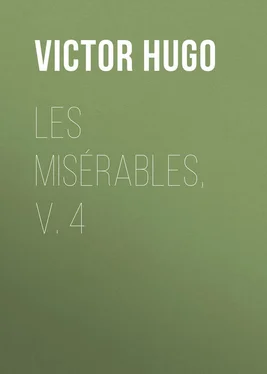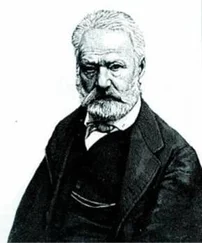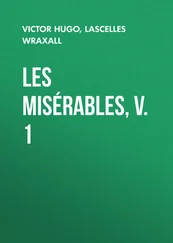Victor Hugo - Les Misérables, v. 4
Здесь есть возможность читать онлайн «Victor Hugo - Les Misérables, v. 4» — ознакомительный отрывок электронной книги совершенно бесплатно, а после прочтения отрывка купить полную версию. В некоторых случаях можно слушать аудио, скачать через торрент в формате fb2 и присутствует краткое содержание. Жанр: literature_19, foreign_antique, foreign_prose, на английском языке. Описание произведения, (предисловие) а так же отзывы посетителей доступны на портале библиотеки ЛибКат.
- Название:Les Misérables, v. 4
- Автор:
- Жанр:
- Год:неизвестен
- ISBN:нет данных
- Рейтинг книги:4 / 5. Голосов: 1
-
Избранное:Добавить в избранное
- Отзывы:
-
Ваша оценка:
- 80
- 1
- 2
- 3
- 4
- 5
Les Misérables, v. 4: краткое содержание, описание и аннотация
Предлагаем к чтению аннотацию, описание, краткое содержание или предисловие (зависит от того, что написал сам автор книги «Les Misérables, v. 4»). Если вы не нашли необходимую информацию о книге — напишите в комментариях, мы постараемся отыскать её.
Les Misérables, v. 4 — читать онлайн ознакомительный отрывок
Ниже представлен текст книги, разбитый по страницам. Система сохранения места последней прочитанной страницы, позволяет с удобством читать онлайн бесплатно книгу «Les Misérables, v. 4», без необходимости каждый раз заново искать на чём Вы остановились. Поставьте закладку, и сможете в любой момент перейти на страницу, на которой закончили чтение.
Интервал:
Закладка:
The wine-shops of the Antoine suburb, which have been more than once referred to in this sketch, possess an historic notoriety. In times of trouble people grow intoxicated in them more on words than wine; and a species of prophetic spirit and an effluvium of the future circulates there, swelling hearts and ennobling minds. These wine-shops resemble the taverns on the Mons Aventinus, built over the Sibyl's cave and communicating with the sacred blasts of the depths, – taverns in which the tables were almost tripods, and people drank what Ennius calls the Sibylline wine. The Faubourg St. Antoine is a reservoir of the people, in which the revolutionary earthquake makes fissures, through which the sovereignty of the people flows. This sovereignty can act badly, it deceives itself like other things, but even when led astray it remains grand. We may say of it, as of the blind Cyclops, "Ingens." In '93, according as the idea that floated was good or bad, or according as it was the day of fanaticism or enthusiasm, savage legions or heroic bands issued from this faubourg. Savage, – let us explain that word. What did these bristling men want, who, in the Genesis of the revolutionary chaos, rushed upon old overthrown Paris in rags, yelling and ferocious, with uplifted clubs and raised pikes? They wanted the end of oppression, the end of tyranny, the end of the sword, work for the man, instruction for the child, social gentleness for the woman, liberty, equality, fraternity, bread for all, the idea for all, the Edenization of the world, and progress; and this holy, good, and sweet thing called progress, they, driven to exasperation, claimed terribly with upraised weapons and curses. They were savages, we grant, but the savages of civilization. They proclaimed the right furiously, and wished to force the human race into Paradise, even were it through trembling and horror. They seemed barbarians, and were saviors; they demanded light while wearing the mask of night. Opposite these men, – stern and frightful we admit, but stern and frightful for good, – there are other men, smiling, embroidered, gilded, be-ribboned, in silk stockings, with white feathers, yellow gloves, and kid shoes, who, leaning upon a velvet-covered table near a marble chimney-piece, gently insist on the maintenance and preservation of the past, of the middle ages; of divine right, of fanaticism, of ignorance, of slavery, of the punishment of death, and of war; and who glorify in a low voice and with great politeness the sabre, the pyre, and the scaffold. For our part, were we compelled to make a choice between the barbarians of civilization and the civilized of barbarism, we would choose the barbarians. But, thanks be to Heaven, another choice is possible; no fall down an abyss is required, either in front or behind, neither despotism nor terrorism. We wish for progress on a gentle incline, and God provides for this. Reducing inclines is the whole policy of God.
CHAPTER VI
ENJOLRAS AND HIS LIEUTENANTS
Shortly after this period, Enjolras made a sort of mysterious census, as if in the view of a possible event. All were assembled in council at the Café Musain. Enjolras spoke, mingling a few half-enigmatical but significant metaphors with his words:
"It behooves us to know where we are, and on whom we can count. If we want combatants we must make them; and there is no harm in having weapons to strike with. Passers-by always run a greater chance of being gored when there are bulls in the road than when there are none. So, suppose we count the herd. How many are there of us? This task must not be deferred till to-morrow, for revolutionists must always be in a hurry, as progress has no time to lose. Let us distrust the unexpected, and not allow ourselves to be taken unawares; we have to go over all the seams which we have sewn, and see whether they hold; and the job must be done to-day. Courfeyrac, you will see the Polytechnic students, for this is their day for going out. Feuilly, you will see those of La Glacière, and Combeferre has promised to go to the Picpus. Bahorel will visit the Estrapade. Prouvaire, the masons are growing lukewarm, so you will obtain us news from the lodge in the Rue de Grenelle St. Honoré. Joly will go to Dupuytren's clinical lecture, and feel the pulse of the medical scholars, while Bossuet will stroll round the courts and talk with the law students. I take the Cougourde myself."
"That is all settled," said Courfeyrac.
"No. There is another very important matter."
"What is it?" Combeferre asked
"The Barrière du Maine."
Enjolras was absorbed in thought for a moment, and then continued, —
"At the Barrière du Maine are stone-cutters and painters, an enthusiastic body, but subject to chills. I do not know what has been the matter with them for some time past, but they are thinking of other things. They are dying out, and they spend their time in playing at dominoes. It is urgent to go and talk to them rather seriously, and they meet at Richefeu's, where they may be found between twelve and one o'clock. Those ashes must be blown up, and I had intended to intrust the task to that absent fellow Marius, who is all right, but no longer comes here. I need some one for the Barrière du Maine, and have no one left."
"Why, I am here," said Grantaire.
"You?"
"I."
"You indoctrinate republicans? you warm up chilled hearts in the name of principles?"
"Why not?"
"Can you possibly be fit for anything?"
"Well, I have a vague ambition to be so."
"You believe in nothing."
"I believe in you."
"Grantaire, will you do a service?"
"Any one; clean your boots."
"Well, do not meddle in our affairs, sleep off your absinthe."
"You are an ungrateful fellow, Enjolras!"
"You be the man capable of going to the Barrière du Maine!"
"I am capable of going down the Rue des Grès, crossing St. Michael's Square, cutting through the Rue Monsieur le Prince, taking the Rue de Vaugirard, passing the Carmelites, turning into the Rue d'Assas, arriving at the Rue Cherche Midi, leaving behind me the Council of War, stepping across the Rue des Vieilles-Tuileries, following the main road, going through the gate and entering Richefeu's. I am capable of all that, and so are my shoes."
"Do you know the men at Richefeu's?"
"Not much."
"What will you say to them?"
"Talk to them about Robespierre, Danton, and principles."
"You!"
"I. You really do not do me justice, for when I make up my mind to it I am terrible. I have read Prudhomme, I know the social contract, and have by heart my constitution of the year II. 'The liberty of the citizen ends where the liberty of another citizen begins.' Do you take me for a brute? I have an old assignat in my draw, – The Rights of Man, the sovereignty of the people, sapristi! I am a bit of a Hébertist myself. I can discourse splendid things for six hours at a stretch, watch in hand."
"Be serious," said Enjolras.
"I am stern," Grantaire answered.
Enjolras reflected for a few seconds, and then seemed to have made up his mind.
"Grantaire," he said gravely, "I consent to try you. You shall go to the Barrière du Maine.".
Grantaire lodged in a furnished room close to the Café Musain. He went away and returned five minutes after – he had been home to put on a waistcoat of the Robespierre cut.
"Red," he said on entering, and looked intently at Enjolras.
Then he energetically turned back on his chest the two scarlet points of the waistcoat, and, walking up to Enjolras, whispered in his ear, "Never fear!" He boldly cocked his hat, and went out. A quarter of an hour after, the back-room of the Café Musain was deserted, and all the Friends of the A. B. C. were going in various directions about their business. Enjolras, who had reserved the Cougourde for himself, was the last to leave. The Members of the Aix Cougourde who were in Paris assembled at that period on the plain of Issy, in one of the abandoned quarries so numerous on that side of Paris.
Читать дальшеИнтервал:
Закладка:
Похожие книги на «Les Misérables, v. 4»
Представляем Вашему вниманию похожие книги на «Les Misérables, v. 4» списком для выбора. Мы отобрали схожую по названию и смыслу литературу в надежде предоставить читателям больше вариантов отыскать новые, интересные, ещё непрочитанные произведения.
Обсуждение, отзывы о книге «Les Misérables, v. 4» и просто собственные мнения читателей. Оставьте ваши комментарии, напишите, что Вы думаете о произведении, его смысле или главных героях. Укажите что конкретно понравилось, а что нет, и почему Вы так считаете.












